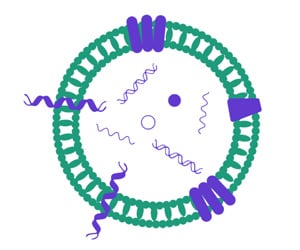Exosome Research
 Production, Isolation & Purification of Exosome
Production, Isolation & Purification of Exosome
Exosomes are small [30-200 nm] cell-specific, membrane-bound structures, also called extracellular vesicles [EVs] that originate in the endosomal compartment and transport nucleic acids, proteins, and lipids derived from the parent cell. They are released into the extracellular space and taken up by target cells and as a such, they mediate the cell-to-cell communication.
Exosomes have been shown to affect the physiological and pathogenesis of multiple diseases, including cancer, neurodegenerative disorders, metabolic, inflammatory, and infectious diseases. The molecular cargo of exosomes varies by cell type, developmental stage, and physiological state of the cell. For example, cancer cell-derived exosomes transport DNA, RNA, and proteins that are tumor specific, and different from those of non-malignant cells. They influence cell proliferation and migration and affect both the development of the tumor microenvironment and the response to traditional therapies.
One of the key advantages of exosomes is that they can be isolated in relatively very low invasive method from various body fluids, including blood, urine, saliva and cerebrospinal fluid, making them an attractive target for diagnostic purposes that is referred as a liquid-biopsy-based diagnostics.
Exosomes can also be isolated from cell culture media from established cell lines and primary cells.
Exosome research has exploded over the last few years, especially in the areas of diagnostic biomarkers and drug delivery. As of January 2023, globally, there are at least 204 ongoing clinical trials focusing on exosome-related studies. Of these, 114 trials are evaluating exosome-based therapeutics and 74 trials are assessing exosome-based diagnostic tests. (Source: Cade Hildreth).
Exosome Services at SBH Sciences
| Isolation and Purification | Characterization | Applications |
| Polymer precipitation Ion-exchange chromatography Size-exclusion chromatography Immunoaffinity |
DNA: PCR-based analysis of exosome genetic content RNA: gene expression profiles (sequencing, RT-qPCR) Protein: bioanalytical (western blot, ELISA/Luminex) Flow cytometry Functional assays: cell proliferation, cytotoxicity, immunomodulation |
Predictive biomarkers Prognostic biomarkers Drug delivery mRNA delivery Vaccine development |
SBH Sciences offers multiple services to advance diagnostic and therapeutic exosome research and development, from initial production, isolation, purification through pre-clinical studies.
Isolation and Enrichment: Exosome isolation can be done using multiple techniques, including polymer precipitation, anion and cation exchange chromatography and size-exclusion chromatography. Specific populations of exosomes can be obtained through antibody-based enrichment [Immunoaffinity]. Exosomes can be isolated from liquid biopsy samples (e.g., blood, serum, plasma, urine, saliva, and cerebrospinal fluid). Moreover, 450+ cell lines and primary cells are available at SBH Sciences for isolation of Exosome. For example, we can use from ThermoFisher: Total Exosome Isolation Reagent (from cell culture media); Cat. No. 4478359.
Characterization: analysis of purified exosomes can be done through several of our drug-discovery services, including molecular biology, bioanalytical, and cell-based assays.
Molecular biology:
DNA purification, PCR-based analysis of exosome DNA content (qPCR, dPCR, isothermal amplification). RNA purification, gene expression analysis (RT-qPCR). Development and validation of novel assays for nucleic acid-based biomarkers.
Bioanalytical:
Development, validation, and application of bioanalytical methods to detect and measure protein content in purified exosomes. Multiple platforms for protein biomarker analysis, including ELISA, Simple Plex (ELLA), Multiplex (Luminex), fully automated western blot (JESS, ProteinSimple), single-color and multi-color flow cytometry.
For example, for Luminex analysis we can use from ThermoFisher: Exosome Characterization 6-Plex Human ProcartaPlex™ Panel ; Cat. No. EPX060-15845-901; Include analysis of CD9, CD63 and CD81.
Cell-based Assays:
In vitro assays are an integral part of the development of exosome-based therapeutics. With hundreds of cell lines and validated cell-based assays, we can develop and perform functional assays for exosome effects in multiple therapeutic areas. These include:
- Cell proliferation
- Cytotoxicity
- Immunomodulation
- Cell migration
Isolation and purification
Although ultracentrifugation is effective for isolating exosome-enriched fractions, there are advantages to using ion-exchange (e.g., Q-Sepharose) and size-exclusion chromatography as multi-steps exosome purification:
- higher purity of exosomes preparations, reduces contamination by proteins/ lipoproteins
- can be used to isolate exosomes from cell culture and multiple biofluids
- can easily be scaled up or down.
We can develop and validate exosome purification kits for your specific projects.
Example for commercial kits that can be used:
Invitrogen™ Total Exosome Isolation Kits: Can be used to obtain and concentrate intact exosomes from biofluids and cell culture media. This polymer-precipitation method efficiently isolates insoluble components of the starting material.
Clarified fluid/media is incubated with the appropriate Total Exosome Isolation Reagent, then centrifuged to separate the insoluble, exosome-contain fraction of the sample.
These preparations can be further purified using antibody-based methods. Exosomal membranes express high levels of the tetraspanins CD9, CD63 and CD81. Bead-based
immunoaffinity reagents, such as the Invitrogen™ Exosome-Human CD9 Isolation Reagent and System Biosciences Exo-Flow96 CD81 IP Kit, yield highly enriched exosomes from biofluids and culture media, ready for further characterization or downstream applications.
Please Note: For Neural Derived Exosomes [NDEs], we can use ExoSORT™ developed and commercially available from NeuroDex. This kit was used for an example by NeuroSense in their preliminary investigation related to Alzheimer’s and Parkinson’s biomarker studies.
Please contact us with your specific needs or any questions related to Exosome services. We would be delighted to work with you.
Our expertise is your competitive edge!
References
Krol, T. et al. Exosomes – The Good, Bad, Ugly and Current State. American Pharmaceutical Review. Monday, April 26, 2021.
Raghu, K and LeBleu, VS. The biology, function, and biomedical applications of exosomes.
Science. 2020 February 07; 367(6478): . doi:10.1126/science.aau6977
Tai, Y-L et al. Exosomes in cancer development and clinical applications. Cancer Sci. 2018 Aug; 109(8): 2364–2374. doi: 10.1111/cas.13697
Sun, K. et al. Exosomes as CNS Drug Delivery Tools and Their Applications. Pharmaceutics. 2022 Oct; 14(10): 2252. doi: 10.3390/pharmaceutics14102252
Kaddour, H. et al. The Past, the Present, and the Future of the Size Exclusion Chromatography in Extracellular Vesicles Separation. Viruses. 2021 Nov; 13(11): 2272. doi: 10.3390/v13112272
Khushman, M. et al. Exosomal Markers (CD63 and CD9) Expression Pattern Using Immunohistochemistry in Resected Malignant and Non-malignant Pancreatic Specimens. Pancreas. 2017 Jul; 46(6): 782-788. doi: 10.1097/MPA.0000000000000847
